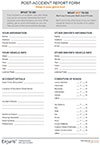Is your insurance company really helping you after an accident?
Almost everyone has some form of insurance.
It's like paying taxes…no one really wants to deal with it, but it's a fact of life. Every state in the U.S. has laws that require car insurance, and while there are variations in what a policy is required to cover, it's crucial that you keep your insurance up-to-date and avoid driving without it. The penalties for driving without insurance (especially if you get into an accident) are steep, so keeping even the minimum policy requirement is essential.
We like to believe that since we choose our insurance company and pay our premiums, the company will stand behind us if we're in a position to need them. But unfortunately, that's not always the case. An insurance company is a business — and the customer isn't always right.
Here's how it works:
An insurance company profits when the amount paid in premiums is higher than what they need to pay out in claims. So, while they probably keep their premium rates competitive with other insurers in your area and for your needs, the objective is always to pay you the least amount possible for a claim.
An insurance company has a set of metrics it uses to determine how much you're owed after an accident. It uses actuarial tables and other financial resources to figure out exactly how much your accident is "worth."
What does insurance cover?
North Carolina is an at-fault state. In at-fault states, the person who is legally at fault for the collision is responsible for the costs. Usually, their insurance carrier pays for damages and injuries of anyone else injured.
Most insurance policies cover damages for:
- Medical treatment for injuries related to the accident
- Lost wages for time off from work because of the injury
- Property loss (i.e. damage or loss to your vehicle or its contents)
Insurance generally does not cover pain and suffering, emotional distress, or punitive damages.
What is insurance bad faith?
Insurance "bad faith" is a term used to describe a claim against an insurance company. Federal law requires that an insurance company owes a duty of good faith and fair dealing to its insureds (customers).
A contract exists when 2 or more parties make an agreement that creates mutual obligations. When an insurance policy is issued, the insured (the person purchasing the policy) agrees to pay the premium rate for the term of the policy. In exchange, the insurance company provides payment if the insured person experiences a loss that's covered under their policy.
A "tort" is any wrongful act or omission that leads to civil liability. Put plainly, it's either negligent or intentional action that results in a person being injured and costs them money. This would include any personal injury lawsuit — from a car accident to premises liability, a product defect, medical malpractice, or anything in between.
A plaintiff may not receive punitive damages for a breach of contract claim, as a matter of public policy. Punitive damages are only awarded when a defendant's actions are especially malicious or egregious, and they're intended as a punishment or deterrent to the defendant so they won't repeat the same behavior. A tort lawsuit can provide punitive damages to a plaintiff, so the law carved out an exception for insurance bad faith in order to encompass both contract law elements and tort law relief.
North Carolina Unfair and Deceptive Practices Act
The North Carolina Unfair and Deceptive Practices Act allows a plaintiff to receive extra-contractual damages. That means you can receive both the settlement that's the subject of the original claim and punitive damages.
The Act requires the plaintiff to prove that the insurance company's behavior was unfair or deceptive or that it violated North Carolina's insurance law.
You can sue for the amount that you should've received as a settlement in your original claim to the insurer (in other words, damages controlled by the insurance policy).
There can be no additional damages except for legal fees.
You can sue for the original amount you should've received PLUS punitive damages. This is when there's a tort in addition to the breach of contract that results in injury (which can be financial loss, not physical injury). In other words, your losses as a result of their tortious breach of the contract amounted to more than what you were owed through the insurance policy.
What are signs of bad faith?
Your insurance company might be acting in bad faith if it:
- Takes an unreasonable amount of time to investigate your claim.
- Doesn't thoroughly investigate your claim.
- Insults you or treats you poorly during the investigation.
- Doesn't respond to your emails, phone calls, or other communications.
- Doesn't answer your questions about your policy or coverage.
- Demands unnecessary paperwork or documents.
- Misplaces your file or information for a significant amount of time.
- Unreasonably delays your claim decision.
- Makes any kind of threat.
- Gives you a lowball settlement offer and refuses to negotiate.
- Denies your claim and doesn't provide an explanation.
Reasons why your insurance claim might be denied
The insurance company has a right to deny your claim, and there's usually a legitimate reason. Here are some common reasons for a claim denial that do NOT necessarily constitute bad faith:
1. You were partially or wholly at fault for the accident
The insurance company isn't required to pay your claim if you were drunk driving or breaking any other law, for example, or if you were at fault for something specifically prohibited under the terms of your policy. That might include if you were texting while driving or otherwise using your phone in a way that's prohibited in North Carolina. North Carolina allows talking on a mobile phone while driving, but prohibits texting and emailing behind the wheel.
If there are other ways that you could've avoided the crash, the insurance company might refuse to pay a claim.
2. You didn't receive a medical evaluation
If you were in an accident, it's crucial to seek a medical evaluation immediately. Some injuries don't appear until days or weeks after an accident. Without an immediate evaluation of your condition, it could be hard to prove that your injuries were the result of the crash.
If you wait too long to have an injury diagnosed and documented, the insurer can dispute whether it happened in the crash. If you can't prove that an injury is the result of the crash, the insurer could refuse to pay for treatment.

Sample post-accident report form to keep in your glove box - fill out at the scene or as soon as you can after a car accident
Download in PDF format
3. You don't have a diagnosed injury
Insurance is meant to compensate you for financial losses. While being frightened and shaken after an injury is common and real, if you can't put a dollar value on it, then you can't claim it as a compensable loss. Even some physical injuries like whiplash can't be paid for by insurance because there's no medical treatment.
If you have a pre-existing condition, it might be difficult to prove to the insurance company that a subsequent injury was from the accident. It's possible for an accident to aggravate or worsen a condition, but it will be hard to determine if a condition existed before the accident or was caused as a result of the accident in question.
4. The claim exceeds your maximum coverage
North Carolina state law requires these minimum liability insurance coverage amounts:
- $30,000 for bodily injury (one person)
- $60,000 for bodily injury (2 or more people)
- $25,000 property damage
You're also required to have uninsured motorist coverage in addition to these minimums.
If the damages you suffer exceed your own automotive policy limits, then either your claim will be paid up to your policy limits or the insurance company could deny the claim.
Liability coverage is the bare minimum coverage you can have in order to drive your car. You might need comprehensive or collision coverage in addition to the basic liability. It's an extra expense to have to pay insurance premiums, but adding coverage for the unexpected can save you a lot of money in the event of an accident.
If you give someone permission to drive your car and that person doesn't have insurance (in other words, they don't own a car that has insurance), you would be liable for the damages. If the accident costs exceed the limit of your insurance, the injured parties could sue you personally for damages.
5. There's a liability dispute
If there's a question as to which driver caused the accident, the insurance companies might not be able to agree on whose responsibility it is to pay out the claims (yours and the other driver's).
If your insurance company believes you didn't cause the accident, it will say that the other driver's insurance is responsible for the claim. If the other driver's insurance says you're responsible and your insurance should pay, you could be at an impasse.
6. You didn't notify your insurance company quickly enough
You have a responsibility to notify your insurance company after a crash. There are definite dos and don'ts about how to talk to your insurance company following an accident. However, you always need to report that an accident happened to your insurer.
If your insurance company isn't notified in a timely manner, it could claim that it didn't have the opportunity to investigate the claim while the evidence was still valid.
The purpose of insurance is to restore you to the condition you'd be in if the accident hadn't happened. If you were in a car accident and totaled your 10-year-old sedan, the insurance company would evaluate the value of your car as it was at the time of the accident. You would receive a settlement for the fair market value of your car — or what you would've likely been able to receive for it if you'd sold it rather than it being in an accident.
You can't exactly "trade up" or expect to recover enough money to buy a brand-new luxury SUV if your loss was a 10-year-old mid-range sedan. Insurance isn't meant to position you better than you were before… it's meant to position you exactly as you would be if the accident hadn't happened.
How and when to hire a bad faith insurance lawyer (and why)
If your insurance company isn't holding up its end of the deal — providing what you need from your claim — maybe it's actually acting in bad faith. The only way to know for sure is to find a bad faith insurance lawyer. Here's when to look, why they're helpful, and how to find the best one for you. Read more
First-party vs. third-party bad faith
There are 2 types of bad faith lawsuits.
- First-party bad faith: This happens when the insurance company refuses to pay a claim without a reasonable basis or doesn't properly investigate the claim in a timely manner.
- Third-party bad faith: In addition to issuing a payout for your claim, your insurance company has a responsibility to defend you against another party's claims. If they fail to do that, it could be considered bad faith.
Choosing a North Carolina lawyer for a bad faith insurance claim
How do you know if you have a bad faith insurance claim? If your bills aren't being paid, there are 1 of 2 things likely happening.
Either:
- Your insurance company is acting in good faith, but is underestimating the full value of your claim; or
- Your insurance company is acting in bad faith and effectively breaching its contract with you.
If the first scenario is true and the insurance company is underestimating the value of your claim, then it's time to get a lawyer involved. Your lawyer should be a trained negotiator who has access to experts in finance, medicine, and whatever other specialties are necessary to correctly assess what your costs are now and what they will be in the future.
If the second scenario is true, then your lawyer will either escalate your claim to a higher level to reach a resolution within the insurance company, or they will advise you about whether a lawsuit is necessary.
Either way, lawyers handle these kinds of situations every day. Remember that an insurance company is big business. Your insurance adjuster also handles these situations every day — and you're probably just another number or a file on their desk.
The adjuster's job is to work for the insurance company, but the lawyer's job is to work for you.
Did you know that bad faith insurance law varies by state?
How to find a personal injury lawyer
How do you know you've found the right attorney to take on your case? Where do you even begin your search? Enjuris spoke with personal injury attorneys in our directory to find out their recommendations for hiring the best lawyer. Read more















